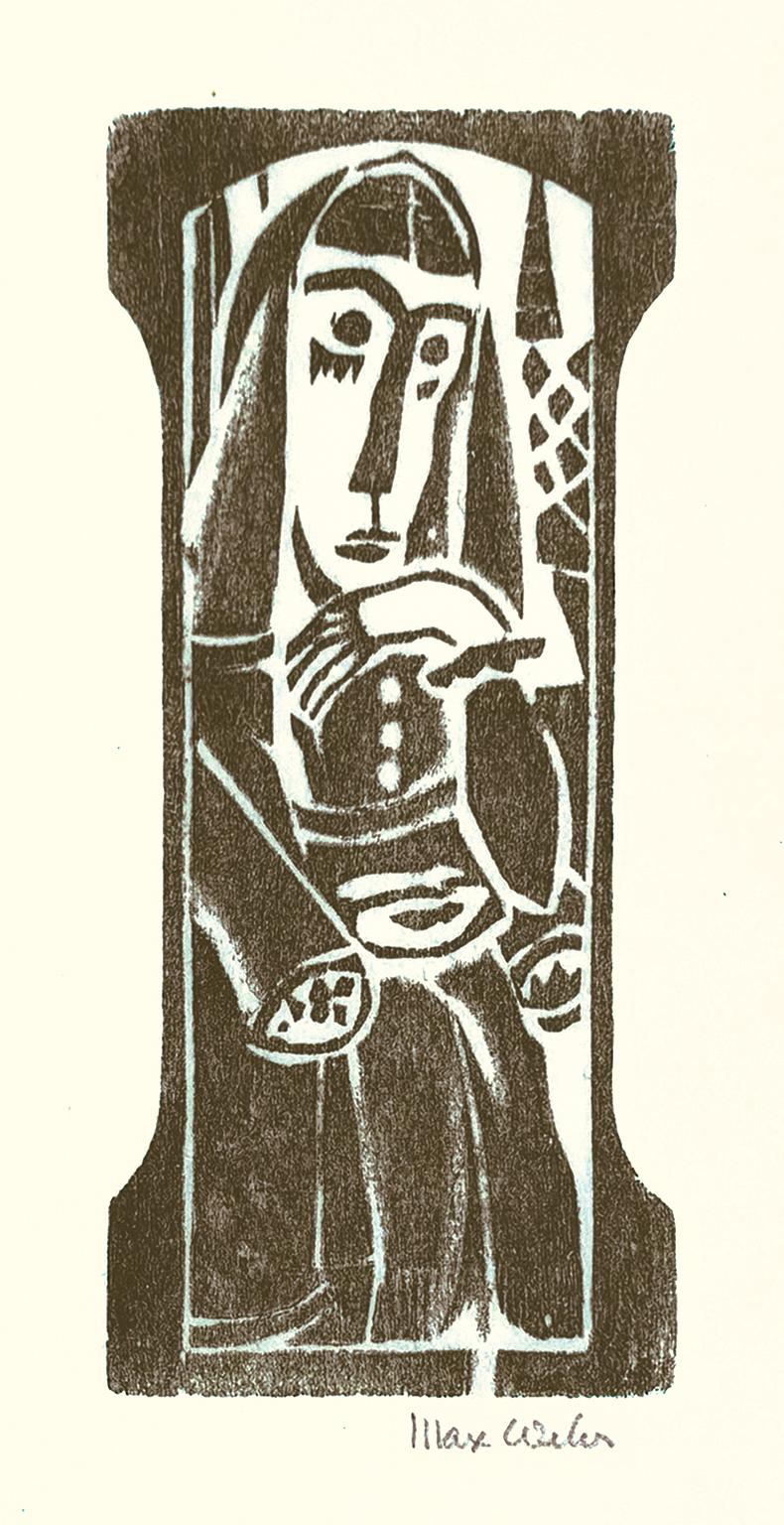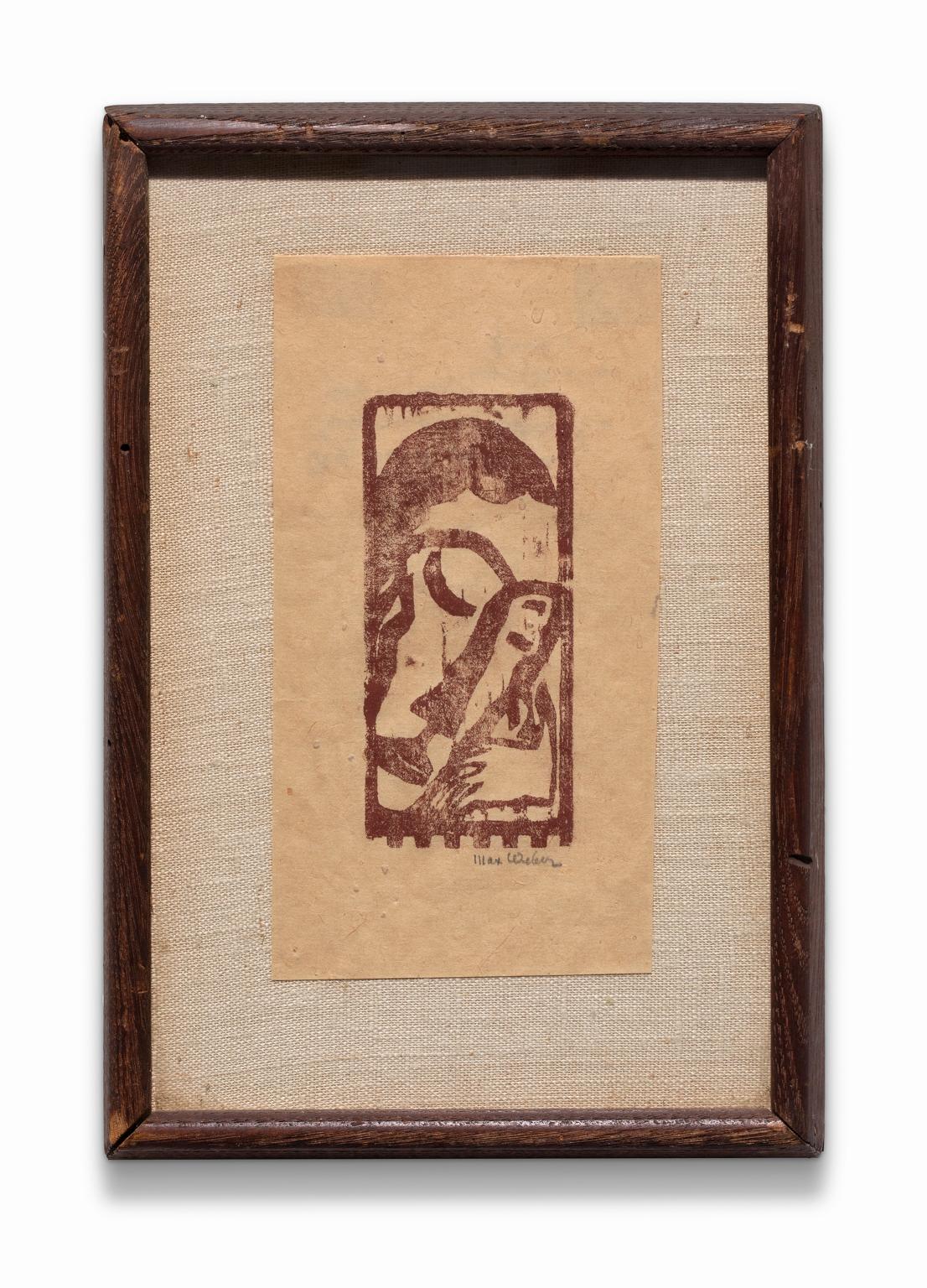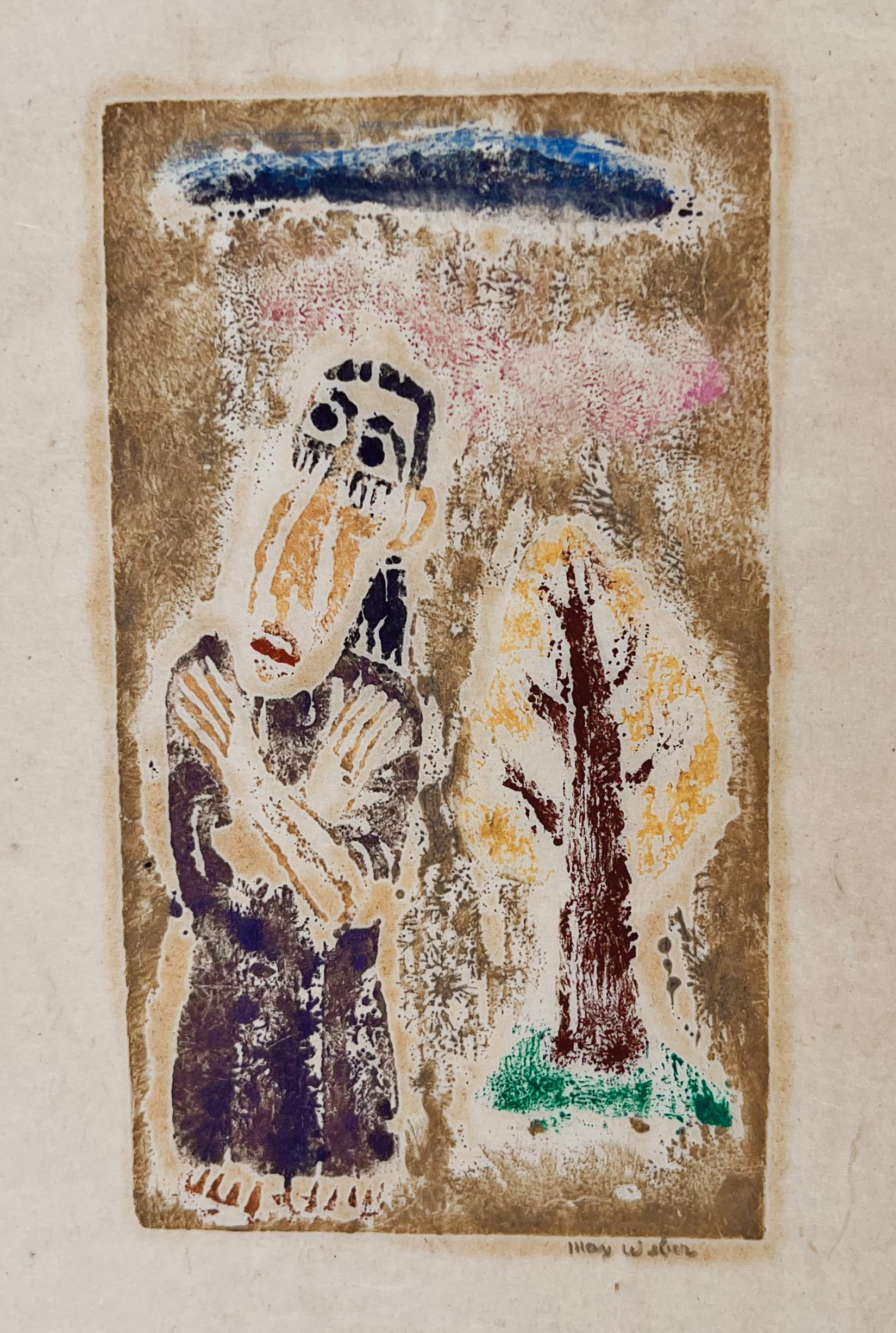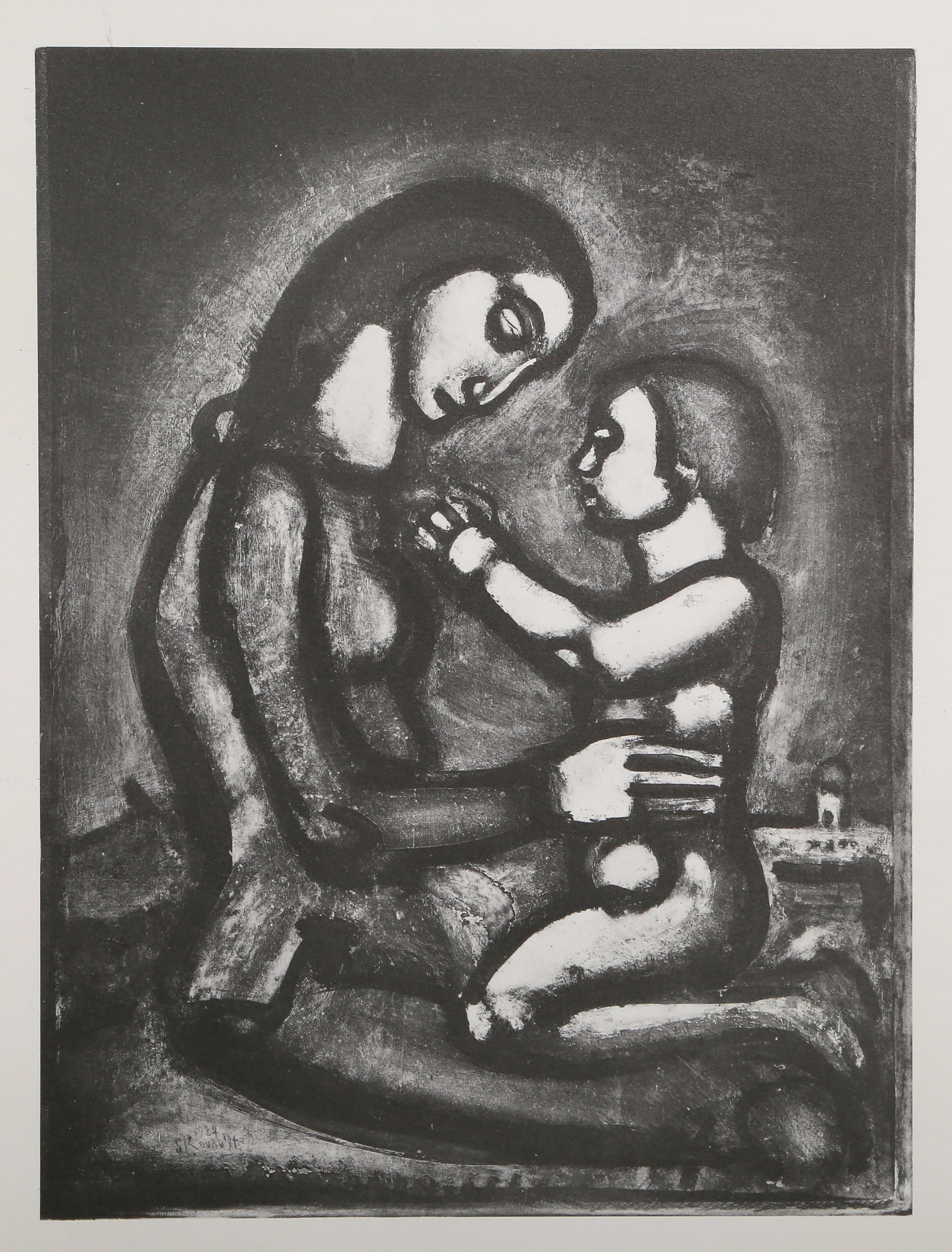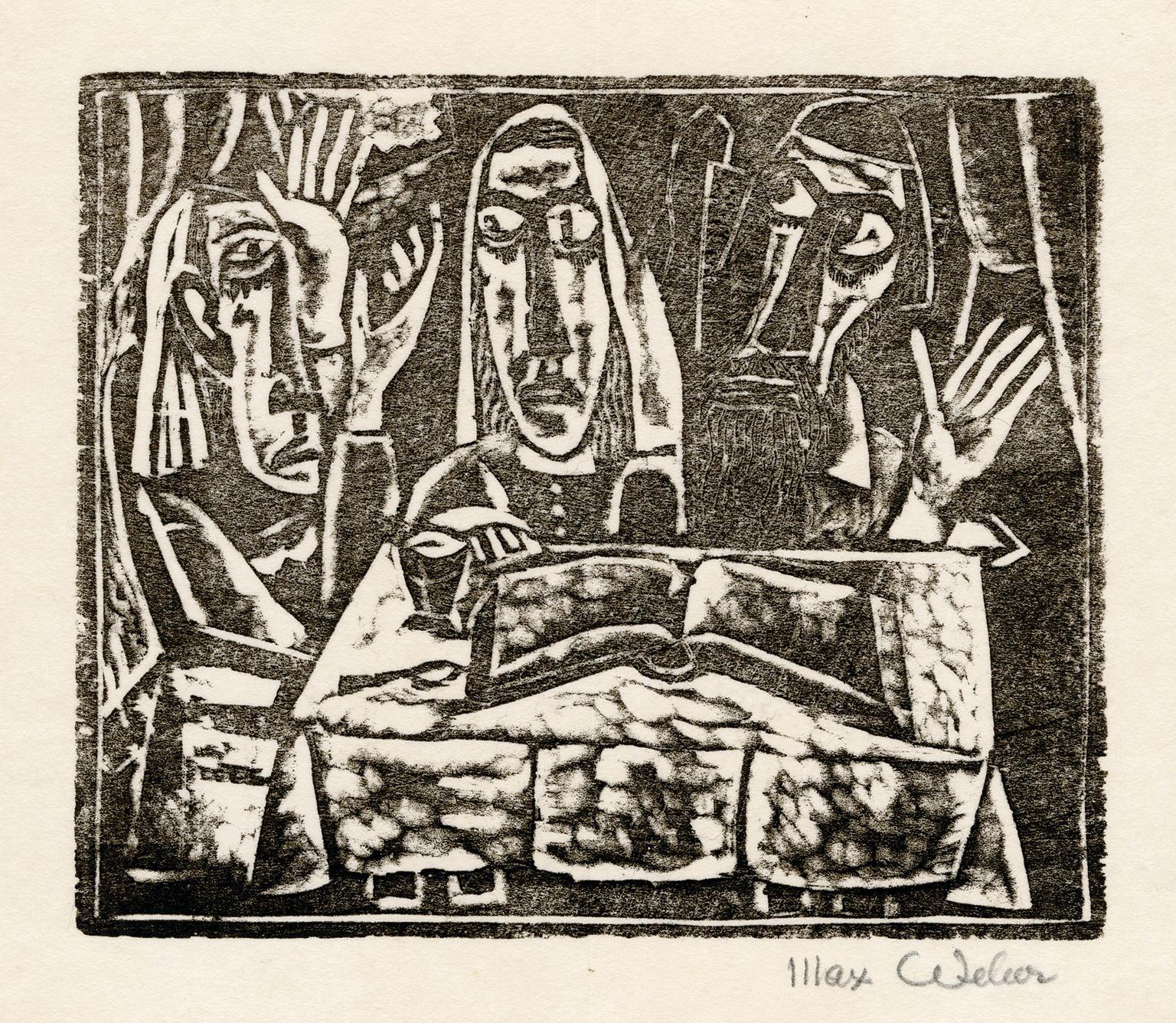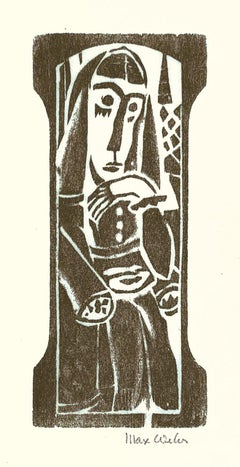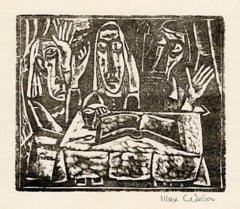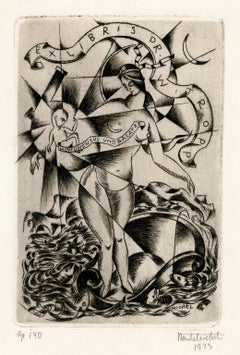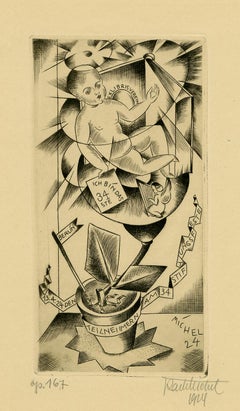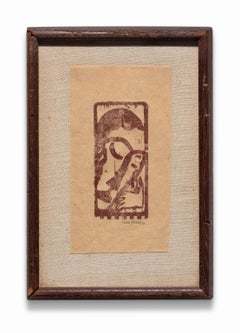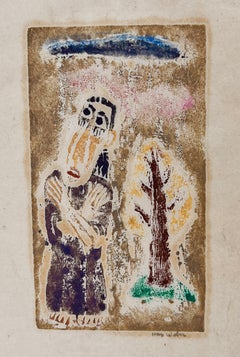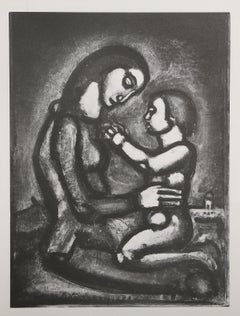Items Similar to Mother Love (Madonna and Child) — American Expressionism
Want more images or videos?
Request additional images or videos from the seller
1 of 3
Max WeberMother Love (Madonna and Child) — American Expressionism1920
1920
$1,400
£1,070.75
€1,225.37
CA$1,992.58
A$2,157.39
CHF 1,146.98
MX$26,019.59
NOK 14,423.97
SEK 13,447.25
DKK 9,151.98
About the Item
Max Weber, 'Mother Love' (Madonna and Child), woodcut, 1920, edition not stated, Rubenstein 35. Signed in pencil. A fine impression, on cream wove Japan paper, with full margins (1 5/8 to 2 5/8 inches), in excellent condition. Scarce. Matted to museum standards, unframed.
Impressions of this work are held in the following collections: Brooklyn Museum, Harvard Art Museum, Jewish Museum, Museum of Modern Art (color), National Gallery of Art, and Philadelphia Museum of Art (color).
ABOUT MAX WEBER'S RELIEF PRINTS
"In summary, Weber’s relief prints cannot be called just primitives or cubist forms. No single stylistic term is a satisfactory label. Collectively they suggest some common denominators: independence from academic traditions, interest in the element of design rather optical realism, simplicity and unpretentiousness in execution, craftlike tradition underlying their formulation and the desire to eschew the exactitude and dryness of wood engraving for the imprecision and painterly effect of hand-blocked work. The work was not a conscious effort at naiveté or lack of sophistication; on the contrary it was an attempt to approach the origins of art.
"In an age which has seen the machine take the feeling of material from the hands of man, these relief prints describe a spirit of craftsmanship and an originality of abstract design that is unique to Max Weber’s artistic oeuvre, to American art, and to the tradition of relief printing."
— Daryl R. Rubenstein, 'Max Weber, A Catalogue Raisonné of His Graphic Work', The University of Chicago Press, 1980.
ABOUT THE ARTIST
"To fill eternity with the ripest and the sanest expression of our consciousness is the essence as well as the purpose of life.” —Max Weber
Max Weber (1881-1961) was born in Bialystok, western Russia. When he was ten, his family came to America, settling in Brooklyn. While enrolled at nearby Pratt Institute from 1898 to 1900, he was a student of the modernist artist and influential teacher Arthur Wesley Dow who advocated for art as a means of self-expression rather than traditional ornament.
Weber became an art teacher, first in the public schools in Lynchburg, Virginia, and beginning in 1903 at the Minnesota Normal School in Duluth. Inspired by Dow’s experience, Weber longed to continue his studies in Europe, and after years of prudent saving, he traveled to Paris in 1905.
He became a devoted disciple of Paul Cézanne, met Guillaume Apollinaire, Robert Delaunay, Pablo Picasso, and Leo and Gertrude Stein, and became close friends with Henri Rousseau, later organizing the first exhibition of Rousseau’s work in the United States. A pupil of Matisse in 1908, he was deeply affected by the great artist’s expressive freedom and boldness of color. In recognition of his gifted assimilation of these many influences, one of Weber’s paintings was accepted for exhibition at the prestigious Salon d’Automne in 1907.
Weber returned to New York and had his first one-man show at the Haas Gallery in April of 1909, revealing himself as one of America’s earliest modernist artists. Although, as might have been expected, his cutting edge work was mostly misunderstood and widely criticized, the show introduced the artist to Arthur B. Davies, who became a supporter and friend. Weber credited Davies with teaching him lithography in 1916, which enabled him to produce some of the earliest American modernist lithographs.
In 1919 Weber created his first group of woodcuts, many of them in color, which were exhibited in 1920 at the Montross Gallery in New York. Davies purchased some of the works, and the esteemed critic and gallery director Carl Zigrosser took other prints to sell at the Weyhe Gallery. That spring, ten of Weber’s poems with ten woodcuts were published in the Yiddish literary journal 'Schriften'. These early figurative abstractions display Weber’s unique melding of Cubist vernacular with primitivist sensibilities and stand among the most avant-garde American prints of the first quarter of the 20th century.
Weber’s subsequent group of relief prints represented Jewish themes, reflecting his heritage and spiritual convictions. Some of these works, such as ‘Feast of Passover’, expanded the artist’s repertoire to depict the interplay of multi-figure groupings. Weber’s prints were frequently reproduced in small literary magazines, and his book 'Primitives', published in 1926, integrated his poetry with his woodcuts.
Weber’s friendship with William Zorach, and an exhibition of the Provincetown printmakers in 1916, inspired his return to color relief prints. During 1919 and 1920, Weber created some thirty block prints—distinguished by their original use of color applied in a painterly manner, each impression being virtually unique.
In 1925 the artist taught at the Art Students League, New York. From 1928 to 1933, he produced thirty-four black ink lithographs, printed from zinc plates. Many of these works demonstrated Weber’s continuing interest in using figurative groupings to explore his Zen-like approach to what he described as “the problem of form, balance of volume and sculpturesque spacial values.”
In 1930 Weber began to receive institutional recognition for his innovative work. That year, the Museum of Modern Art mounted a retrospective exhibition of his work, and four years later, the Metropolitan Museum of Art in New York purchased a painting. This interest was sustained through several important exhibitions in the 1940s and 1950s.
Today Weber's work is included in every major American art museum including The Art Institute of Chicago; Cleveland Museum of Art; Detroit Institute of Arts; Los Angeles County Museum of Art; Metropolitan Museum of Art; Museum of Fine Arts, Boston; Museum of Modern Art; National Gallery of Art; Philadelphia Museum of Art; Smithsonian American Art Museum; Solomon R. Guggenheim Museum; and Whitney Museum of American Art.
- Creator:Max Weber (1881-1961, American)
- Creation Year:1920
- Dimensions:Height: 4.82 in (12.25 cm)Width: 2.13 in (5.42 cm)
- Medium:
- Movement & Style:
- Period:
- Condition:
- Gallery Location:Myrtle Beach, SC
- Reference Number:Seller: 1019651stDibs: LU532316315542
About the Seller
5.0
Recognized Seller
These prestigious sellers are industry leaders and represent the highest echelon for item quality and design.
Platinum Seller
Premium sellers with a 4.7+ rating and 24-hour response times
Established in 1995
1stDibs seller since 2016
333 sales on 1stDibs
Typical response time: 1 hour
Associations
International Fine Print Dealers Association
- ShippingRetrieving quote...Shipping from: Myrtle Beach, SC
- Return Policy
More From This Seller
View All'Seated Figure' — American Expressionism
By Max Weber
Located in Myrtle Beach, SC
Max Weber, 'Seated Figure", woodcut, edition not stated, 1919-20, Rubenstein 17. Signed in pencil. A fine impression on cream Japan paper; the full sheet with margins (2 to 3 1/8 in...
Category
1920s Expressionist Figurative Prints
Materials
Woodcut
'Feast of Passover' — American Expressionism
By Max Weber
Located in Myrtle Beach, SC
Max Weber, Untitled 'Feast of Passover', woodcut, 1920, edition proofs—this impression from the edition of 25 printed in 1956, Rubenstein 30. Signed in pencil...
Category
1920s Expressionist Figurative Prints
Materials
Woodcut
'Ex Libris Dr. Witropp' — German Expressionism
By Karl Michel
Located in Myrtle Beach, SC
Karl Michel, 'Ex Libris Dr. Witropp - Homunculus und Galatee', etching, 1923, edition not stated. Signed, dated, and numbered 'Op. 140' (the artist's inventory number) in pencil. Si...
Category
1920s Expressionist Figurative Prints
Materials
Etching
'Ex Libris Verein' — 1920s German Expressionism
By Karl Michel
Located in Myrtle Beach, SC
Karl Michel, 'Ex Libris Verein' (New Year's Ex Libris Club Announcement), etching, 1924. Signed, dated, and numbered 'op. 167' in pencil. Signed and dated in...
Category
1920s Expressionist Figurative Prints
Materials
Etching
Rendez-Vous — Early 20th-Century Modernism
By Boris Lovet-Lorski
Located in Myrtle Beach, SC
Boris Lovet-Lorski, Untitled (Rendez-Vous), lithograph, edition 250, 1929. Signed in pencil. Signed in the stone, lower right. From a suite of 10 lithographs published by the artist ...
Category
1920s American Modern Nude Prints
Materials
Lithograph
'Venus' — German Expressionism
By Karl Michel
Located in Myrtle Beach, SC
Karl Michel, 'Venus, Ex Libris - Hanns U. Herta Heeren', woodcut, 1923, edition not stated but small. Signed, dated, and numbered 'op.154' in pencil. Signed in the block, lower left. A fine impression, on cream Japan paper, with full margins (15/16 to 2 11/16 inches), in good condition. Printed by the artist. Matted to museum standards (unframed).
.
Translation: Venus Ex Libris for Hanns and Herta Heeren.
Image size 5 15/16 x 4 inches (156 x 102 mm); sheet size 9 5/8 x 6 inches (245 x 152 mm).
ABOUT THE ARTIST
Karl Michel (1889-1984) was a noted graphic designer and expressionist printmaker during Germany's pre-Nazi Weimar Republic (1919-1933). Michel’s work was the subject of a feature article in the influential German graphic design magazine Das Plakat (The Poster) in 1920. An anti-war advocate, Michel created a suite of 12 wood engravings depicting his impressions of the humanitarian toll of WWII entitled ‘Humanitas’ (Humanity). The German publishing house Greifenverlag published the series in a reduced folio of unsigned prints.
Michel’s graphic work is held in the permanent collections of the Auckland War Memorial Museum (New Zealand), Frederikshavn Kunstmuseum & Exlibrissamling (Denmark), Museum of Applied Arts (Budapest), The Robert Gore Rifkind Center for German Expressionist Studies at the Los Angeles County Museum of Art, and the German Expressionism...
Category
1920s Expressionist Figurative Prints
Materials
Woodcut
You May Also Like
Max Weber, Figure
By Max Weber
Located in New York, NY
One of America's great modernist innovators, Max Weber carved Figure, 1919-20, on the end piece of a wooden cigar box. This Cubist image is composed o...
Category
Early 20th Century Modern Figurative Prints
Materials
Woodcut
Max Weber Woodcut Print from "Primitives" Poetry Book Signed
By Max Weber
Located in Detroit, MI
ONE WEEK ONLY SALE
This woodcut print is an expressionist print on one of the poems from Max Weber's poetry collection "Primitives: Poems and Woodcuts". This work is signed in penci...
Category
1920s Expressionist Figurative Prints
Materials
Woodcut
Invocation
By Max Weber
Located in New York, NY
M a x W e b e r – – 1 8 8 1 – 1 9 6 1
Invocation- – 1919-20, Color Woodcut.
Rubenstein 27. Proofs only. Signed in pencil.
Image size 3 3/4 x 2 1/8 inches (124 x 54 mm); sheet size ...
Category
1910s Cubist Figurative Prints
Materials
Woodcut
$13,500
Mother and Child, Modern Collotype after Georges Rouault
By Georges Rouault
Located in Long Island City, NY
Georges Rouault, After, French (1871 - 1958) - Mother and Child, Portfolio: Twenty Four Masterpieces of Graphic Art, Year: Year Printed 1974, Medium: Collotype, Image Size: 14 x ...
Category
1970s Modern Figurative Prints
Materials
Photogravure
original lithograph
By Max Weber
Located in Henderson, NV
Medium: original lithograph. This lithograph is from the rare 1951 "Improvisations" portfolio, published by the Artists Equity Association of New York on the occasion of the 1951 Spr...
Category
1950s Prints and Multiples
Materials
Lithograph
"Woman Desired by Man" original woodcut
By Max Pechstein
Located in Henderson, NV
Medium: original woodcut. Printed in 1920 for the Deutsche Graphiker der Gegenwart portfolio, and published in Leipzig by Klinkhardt & Biermann in an edition of 500. Catalogue refere...
Category
1920s Expressionist Figurative Prints
Materials
Woodcut
More Ways To Browse
Harvard Antique
Antique Steins
Antique Block Print
Vintage French Posters Nude
Vulgate Bible
Walter Henry Williams
Wesselmann Foot
Western Airlines Poster
Whistler Original Print
William Greengrass
Winslow Homer Etchings
Zodiac Sign Hebrew
1790 Lithograph
1800s Vintage Dresses
1940s Vintage Pin Up Art
1972 Pontiac
1980s Vintage Museum Poster
Alec Monopoly Signed
